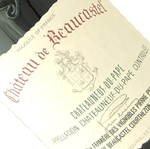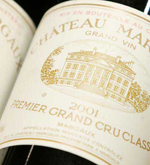wine report Burgundy vintage 2019 first glance
Burgundy 2019 vintage report by Vinfilio
Now that producers Burgundy. have brought in the last of their 2019 crop, spirits are high across the region. Extremely warm weather and uneven flowering early in the season reduced yields, but the quality of the surviving fruit is exceptional. Early reports show that the grapes are deeply concentrated and intense this year—a quality that could signify great aging potential and value in the future. In this 2019 Burgundy vintage report, we highlight the wines we believe will have the greatest complexity and value this year so that you can make the most informed decisions about how to invest when the vintage is released.
Hot, Dry Weather Produced Concentrated Fruit
Climate change has impacted the Burgundy region for the better part of a decade, but record highs were set across France last summer and the 2019 Burgundy vintage saw temperatures that were even more extreme than usual. While it’s still too early to say precisely how the 2019 Burgundy vintage will taste, one thing is certain: You will likely not find many light, delicate wines this year. This vintage will be unapologetically bold and unbelievably concentrated.
However, while hot summer weather had a significant effect on the grapes, the mild winter and spring seasons also contributed to the fruit’s overall quality. In the winter, the weather was mild and not particularly cold, which led to some early budding in the spring. In May, rain replenished the water table, which was a major benefit for winemakers by the time the warm, dry summer months hit. In April, frost threatened the vines in some areas (which is not unusual in Burgundy), but the damage wasn’t as extensive as it has been in years past. Frost primarily impacted the Mâconnais region this year, yet even this area managed to escape significant frost damage.
Some grapes almost raisined on the vine this year and will likely produce very ripe, impressive wines.
By June, the weather was actually cooler than usual, and this resulted in the first major problem for Burgundian winemakers. Flowering during this period was uneven and millerandage (differences in size and maturity among grapes in the same cluster) was quite common. Because of this, winemakers had to cull many of the smaller, unripe berries in the summer so that the remaining fruit would mature more evenly. By the time the summer months approached, winemakers had yet another problem. The blazing hot sun and lack of rain in July and August burned some of the grapes on the vine, making them unusable by the time the harvest season arrived. The hot weather was a double-edged sword for winemakers. On one hand, it reduced the overall size of the crop, but on the other hand, it produced grapes with incredible depth of flavor. Some grapes almost raisined on the vine this year and will likely produce very ripe, impressive wines.
What Will the 2019 Burgundy Vintage Taste Like?
Despite the scorching temperatures of the summer, the 2019 Burgundy vintage is surprisingly well-balanced, even at this early stage of development. Professional critics and winemakers who have tried samples of the young wine say that the reds have excellent acidity. These wines are deep garnet in color and have a complex, fruity flavor. Be aware, however, that 2019 red Burgundy will be much higher in alcohol than last year. The high alcohol by volume will help these wines age for decades, so this is a prime time to invest in iconic age-worthy Burgundy labels, like Domaine de la Romanée-Conti Romanée-Conti or Domaine du Clos de Tart Clos de Tart Grand Cru. If you’re looking to buy easy-drinking red Burgundy, though, you may find that these wines are overly hot in their youth.
The quality of 2019 white Burgundy is also very promising, particularly for age-worthy labels like Domaine Leflaive Bâtard-Montrachet Grand Cru or Domaine Leroy Corton-Charlemagne Grand Cru. Chardonnay is supremely rich and ripe in 2019, with excellent balance and slightly less alcohol compared to the red wines. Most white grapes were harvested in early September, just as the weather was starting to cool down in Burgundy. As a result, the white wines aren’t quite as hot as the reds and they are also deeply aromatic and elegant. If you want to add more high-quality white Burgundy to your collection, the 2019 vintage is an excellent opportunity to do so.
Grapes Are High in Quality, But Yields Are Low
If you plan on investing in the 2019 Burgundy vintage, keep in mind that yields are much lower on average than usual. The combination of uneven flowering, April frost, and high summer temperatures significantly reduced yields across the entire region, and some subregions in particular were hit very hard. For example, southern regions of Burgundy (where the weather was the hottest) produced 50 to 60 percent less fruit than usual for both red and white grapes. Yields will be comparable to 2016—this was a difficult year for producers, particularly in Côte d’Or. In the north, the weather wasn’t as extreme, so yields are higher. For example, in Gevrey-Chambertin, producers experienced only about a ten percent reduction in crop size, on average.
2019 Burgundy prices could be higher than usual due to the vintage’s rarity.
Low yields could affect the release dates for last year’s vintage. The 2018 Burgundy vintage was healthy and plentiful, so some producers are starting to sell these bottles earlier than normal in order to build a financial buffer before the 2019 vintage is released. This is good news if you are interested in buying 2018 wines, as you may see more of these on the market a little sooner than expected.
This year’s yields will also have an impact on future market prices and allocations. For example, the price of 2018 Burgundy may decrease slightly, as there will be much more of this wine on the market than the 2019 Burgundy vintage. Meanwhile, 2019 Burgundy prices could be higher than usual due to the vintage’s rarity. It’s a good idea to invest in 2019 futures or buy these wines as early as possible after release due to the limited amount available. Collectors who order 2019 Burgundy futures or pre-arrivals will likely discover that they have fewer allocations available than usual and that the allocations are much stricter. There’s a particularly small amount of 2019 white Burgundy available, so these wines may increase dramatically in price once the vintage is released. For this reason, it’s important to plan well in advance if you want to purchase wines from this vintage.
Should You Invest in the 2019 Vintage?
In terms of flavor, the 2019 Burgundy vintage is an ideal choice for collectors who enjoy rich, full-bodied wines with intense fruit and heady aromatics. If you prefer wines that are more restrained or acidic, then this vintage may not be the best choice for your collection. Still, while these wines are unquestionably intense, wines from the best grand cru producers in Burgundy will likely retain a great deal of elegance. You’re not likely to find any clumsy wines from top producers like Domaine Leflaive, Maison Louis Jadot, or Domaine Ponsot. These wines will require some time in storage for the high alcohol and prominent tannins to soften and meld with the more subtle underlying flavors, but once they do, they could very well become some of the most delicious and complex wines of the decade.
If rarity doesn’t matter to you, then the 2018 vintage could be a better choice.
To decide whether the 2019 Burgundy vintage is worth investing in, consider the style of wine you prefer to drink and what you plan to do with your Burgundy collection long-term. If you enjoy bold, complex wines that are extremely rare and you don’t mind spending more money upfront to obtain these bottles, then the 2019 vintage is an excellent choice. If rarity doesn’t matter to you, then the 2018 vintage could be a better choice, as these wines are also quite concentrated and should be lower in price. Ultimately, both of these vintages are very promising and will make ideal additions to a serious Burgundy collection.









